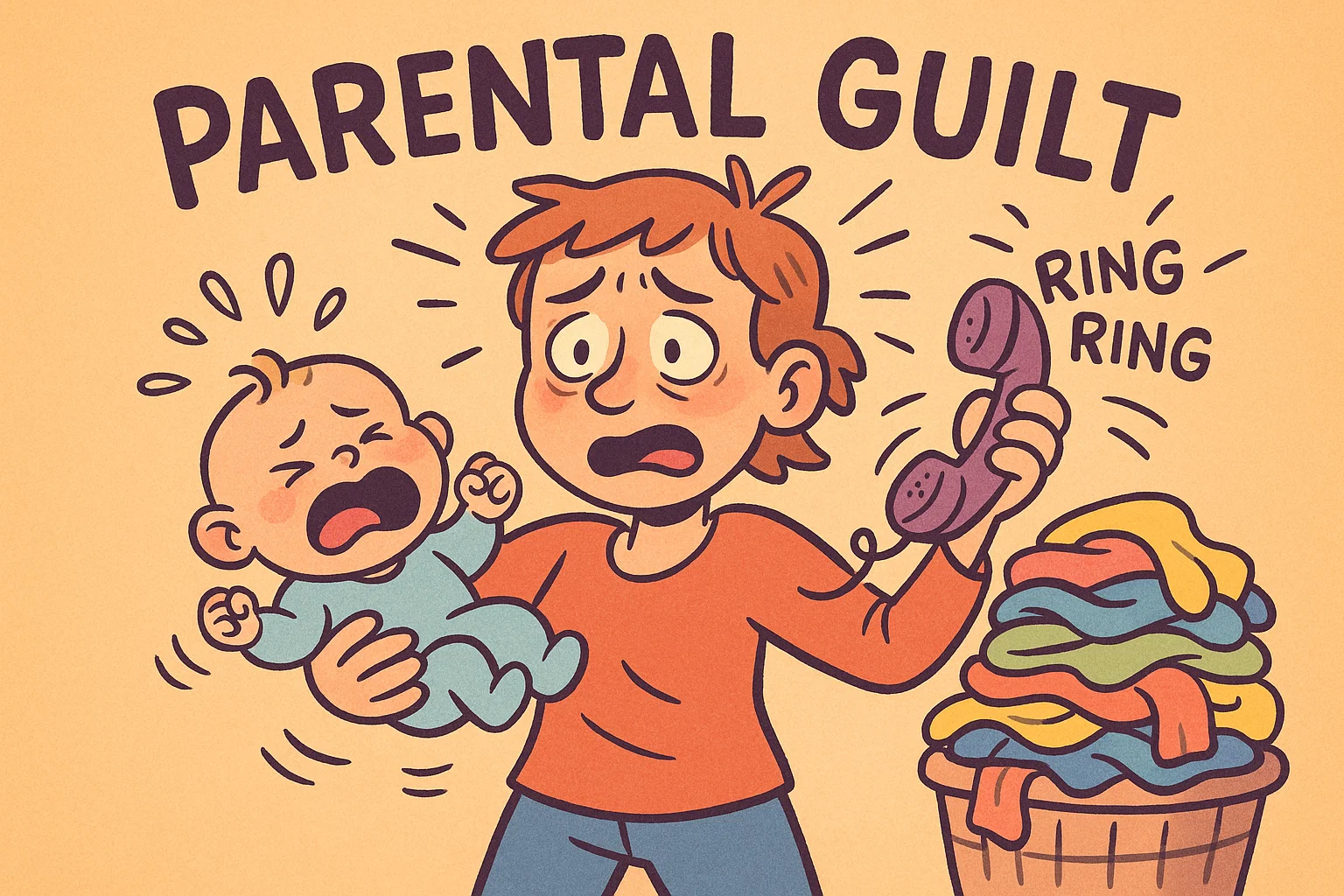Parental guilt affects nearly every parent at some point in their journey. Whether you’re a working mother wondering if you’re spending enough time with your children or a single parent questioning your decisions, these feelings of guilt are more common than you might think.
Understanding and addressing parental guilt isn’t just about feeling better—it’s about creating healthier family dynamics and modeling emotional resilience for your children. When parents feel overwhelmed by guilt, it can impact their decision-making, self-esteem, and overall family well-being.
Signs You Experience Parent Guilt 😰
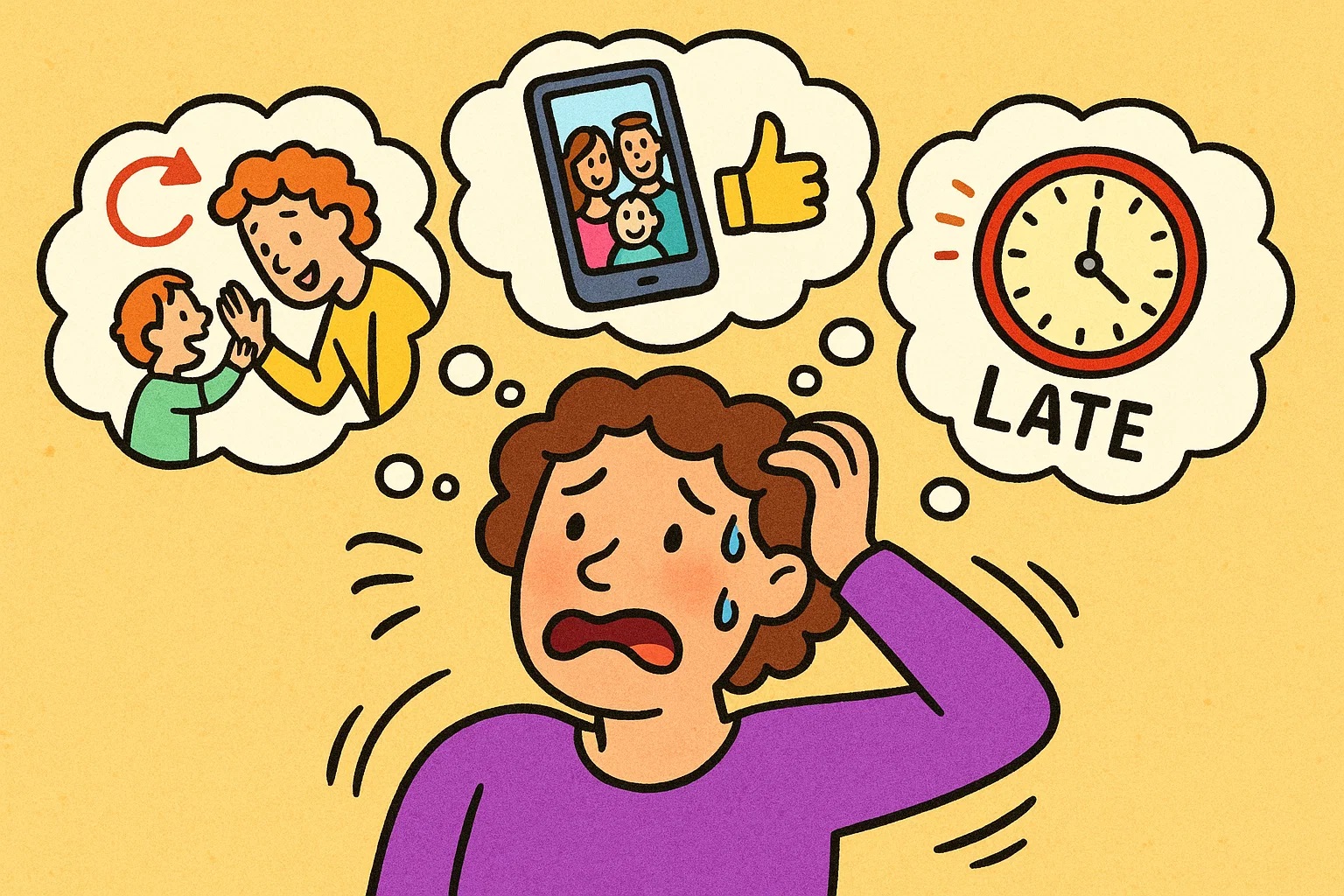
Recognizing parental guilt can be challenging because it often disguises itself as concern for your child’s well-being. Many parents dismiss these feelings as normal worry, but persistent guilt patterns can significantly impact both parent and child.
Second-Guessing Parenting Decisions
Do you find yourself constantly questioning choices you’ve already made? Parents often replay scenarios in their minds, wondering if they handled a situation correctly. This might manifest as:
- Lying awake at night rehashing a conversation with your teenager
- Asking friends repeatedly if you made the right choice about discipline
- Changing decisions frequently based on temporary doubts
- Feeling paralyzed when facing new parenting challenges
Dr. Sarah Clark from the University of Michigan notes that “persistent second-guessing can erode parental confidence and create inconsistency in child-rearing approaches.”
Apologizing Excessively to Children
While teaching children about apologies is important, excessive apologizing can signal underlying guilt issues. This pattern includes:
- Saying sorry for normal parental boundaries
- Apologizing for working late or missing events
- Over-explaining routine decisions to young children
- Feeling the need to justify every “no”
Overcompensating With Gifts 💝
Parents feel compelled to make up for perceived shortcomings through material gestures. Warning signs include:
- Buying toys after setting boundaries
- Expensive purchases following work trips
- Using gifts as primary emotional connection tools
- Feeling guilty when saying no to purchases
Neglecting Personal Needs
Mother guilt particularly manifests in self-neglect. Signs include:
- Skipping meals while ensuring children eat well
- Avoiding social activities with friends
- Postponing medical appointments indefinitely
- Feeling guilty during rare moments of relaxation
Constant Comparison to Other Parents
Social media has intensified comparative parenting, with many parents measuring themselves against curated online personas. This manifests as:
- Feeling inadequate after viewing other families’ achievements
- Questioning your parenting style based on others’ choices
- Avoiding parent groups due to comparison anxiety
- Spending excessive time researching “perfect” parenting methods
Reasons Why Parents Feel Guilty
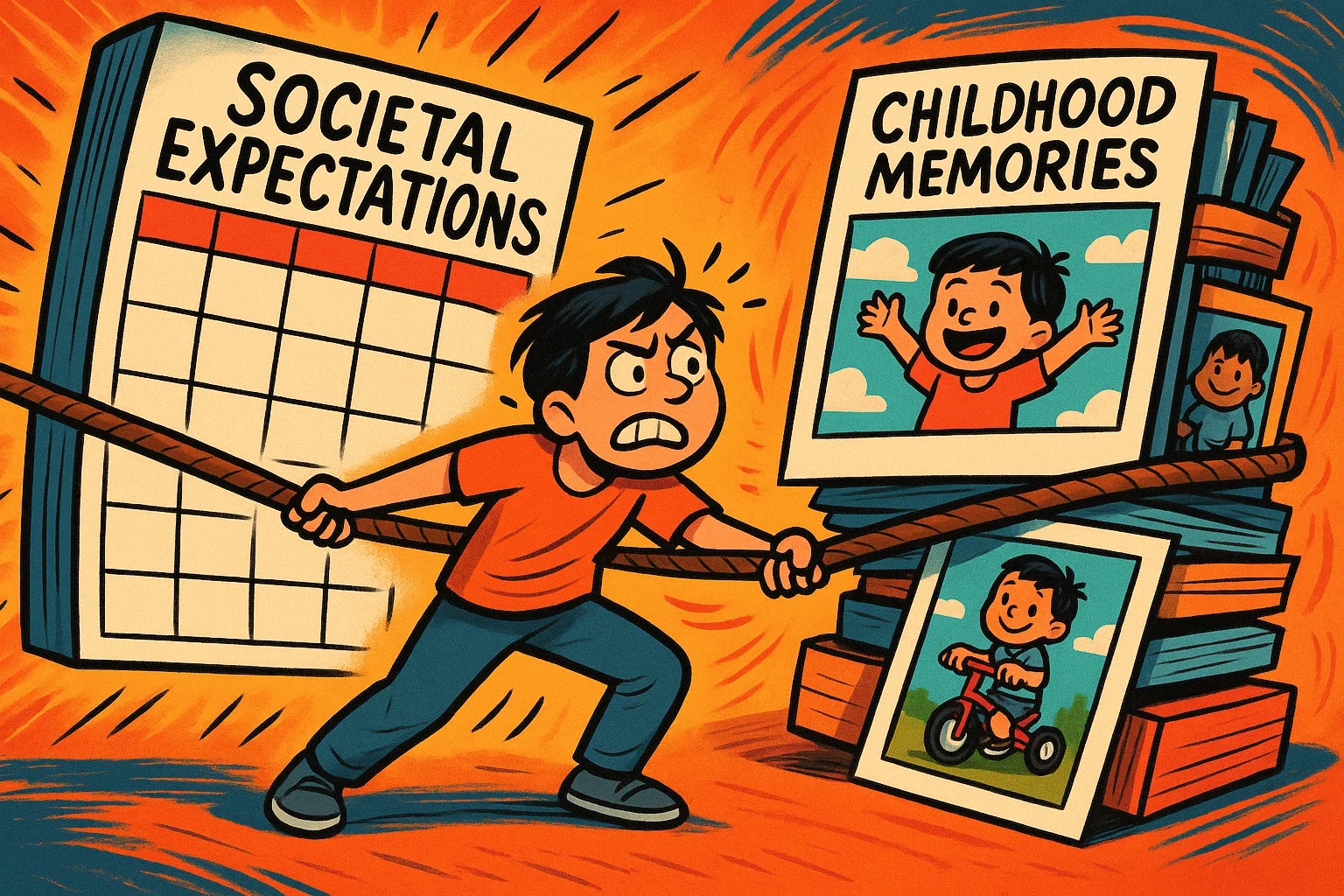
Understanding the root causes of parental guilt helps normalize these experiences while identifying areas for growth. Parents often experience guilt from multiple sources simultaneously, creating complex emotional patterns.
External Factors
Modern society places unprecedented pressure on parents through various channels:
Societal Expectations: Contemporary parenting standards have intensified dramatically. Where previous generations might have focused on basic safety and education, today’s parents feel pressure to optimize every aspect of their child’s development.
| Traditional Parenting Focus | Modern Parenting Expectations |
| Safety, food, shelter | Emotional intelligence development |
| Basic education | Multiple extracurricular activities |
| Community supervision | Constant parental supervision |
| Natural consequences | Structured learning opportunities |
Digital Age Pressures: Social media creates an illusion of perfect families, making ordinary parenting moments seem inadequate. A study by the University of Michigan, Ann Arbor found that 90% of mothers compare themselves to other parents online, with 68% reporting increased guilt afterward.
Economic Pressures: Financial constraints can trigger guilt about not providing enough opportunities. Single parents particularly struggle with this, often working multiple jobs while feeling guilty about time away from children.
Internal Factors
Personal history and psychological patterns significantly influence parental guilt:
Childhood Experiences: Adults who experienced critical parenting may internalize harsh self-judgment.
Perfectionism: High achievers often apply unrealistic standards to parenting. These unrealistic expectations create inevitable disappointment and subsequent guilt cycles.
Control Issues: Parents who struggle with uncertainty may experience guilt when unable to control outcomes for their children.
Shifts in Parenting Style
Adapting your approach as children grow can trigger guilt about previous methods:
- Becoming more permissive and questioning past strictness
- Implementing firmer boundaries after being too lenient
- Changing strategies based on new information or child’s needs
- Feeling inconsistent when adjusting to different children’s temperaments
Gender Differences in Guilt 👩👧👦
Here are distinct patterns in how mothers and fathers experience parental guilt:
Maternal Guilt: Often centers on work-life balance, with working mothers reporting higher guilt levels than stay-at-home mothers. Common themes include:
- Time spent away from children
- Career advancement versus family time
- Household management standards
- Emotional availability during stressful periods
Paternal Guilt: Increasingly common as father roles expand, focusing on:
- Financial provision pressures
- Emotional connection with children
- Involvement in daily care tasks
- Work-life balance challenges
The Impact of Parent Guilt on the Family
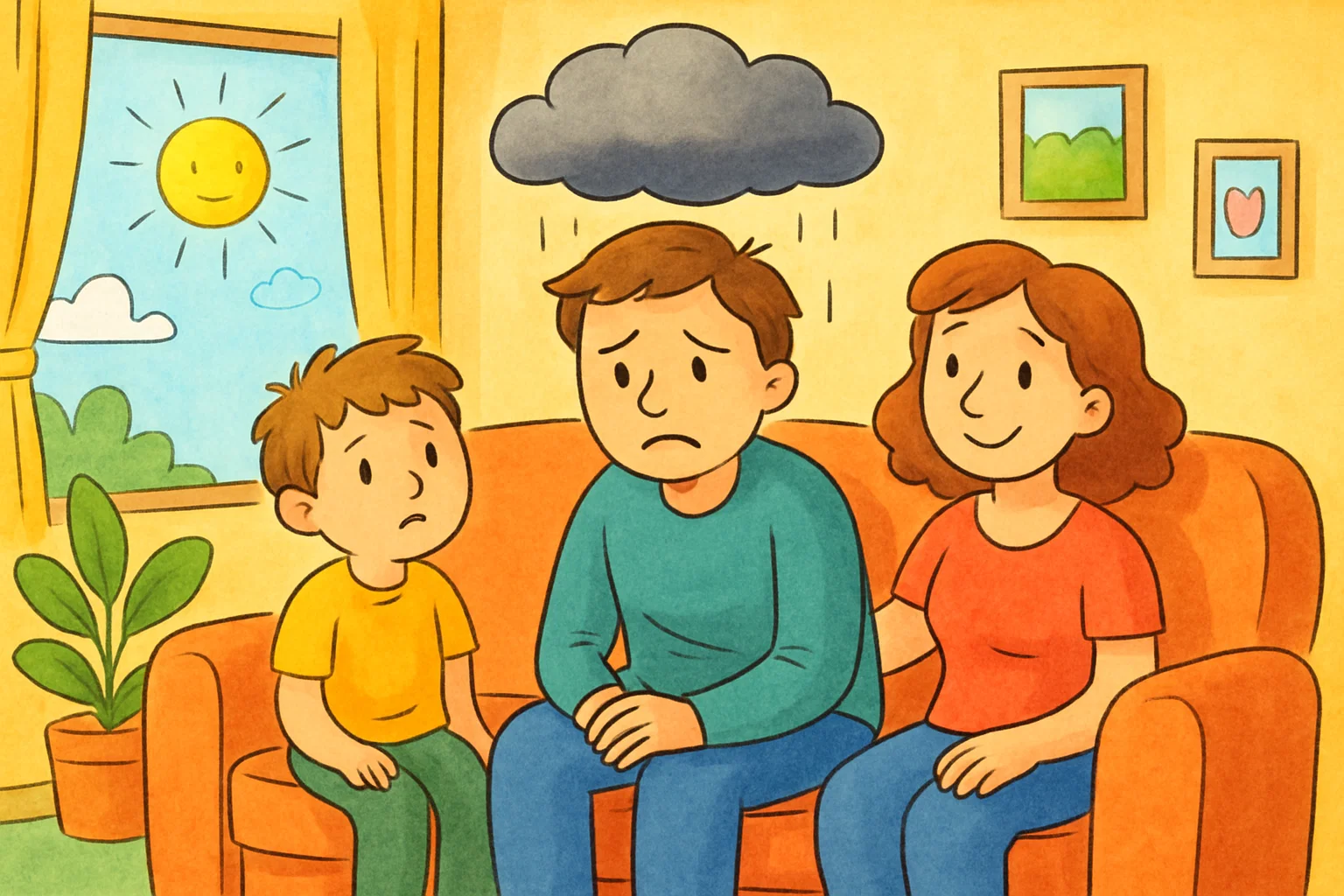
Unaddressed parental guilt creates ripple effects throughout family systems, influencing relationships and household dynamics in significant ways.
Effect on the Parent
Chronic guilt takes a measurable toll on parental well-being:
Mental Health Consequences: Persistent guilt correlates with increased anxiety and depression rates. The American Psychological Association reports that 43% of parents with high guilt levels also meet criteria for anxiety disorders.
Decision-Making Impairment: Guilt-driven parents often make inconsistent choices, prioritizing guilt relief over long-term family goals. This can manifest as:
- Avoiding necessary discipline to prevent feeling “mean”
- Making impulsive decisions to appease guilt
- Struggling with boundary-setting
- Difficulty trusting parental instincts
Physical Health Impact: Chronic stress from guilt affects physical well-being through sleep disruption, appetite changes, and weakened immune function.
Effect on the Child
Children are remarkably perceptive and often absorb parental emotional states:
Emotional Regulation Challenges: Children of highly guilt-prone parents may struggle with their own emotional boundaries. They might learn to:
- Manipulate parental guilt to avoid consequences
- Take responsibility for parent emotions
- Develop anxiety about their own mistakes
- Struggle with healthy independence
Inconsistent Expectations: When parents alternate between guilt-driven permissiveness and overcorrection strictness, children receive mixed messages about expectations and boundaries.
Impact on Family Dynamics
Guilt affects the entire family ecosystem:
Communication Patterns: Guilt can create indirect communication styles where important conversations are avoided to prevent additional guilt triggers.
Sibling Relationships: Guilt-driven favoritism or overcompensation can create imbalances between children, affecting sibling dynamics.
Co-Parenting Challenges: In two-parent households, differing guilt levels can create disagreements about discipline and expectations.
How to Cope When You Feel Guilty 🌱
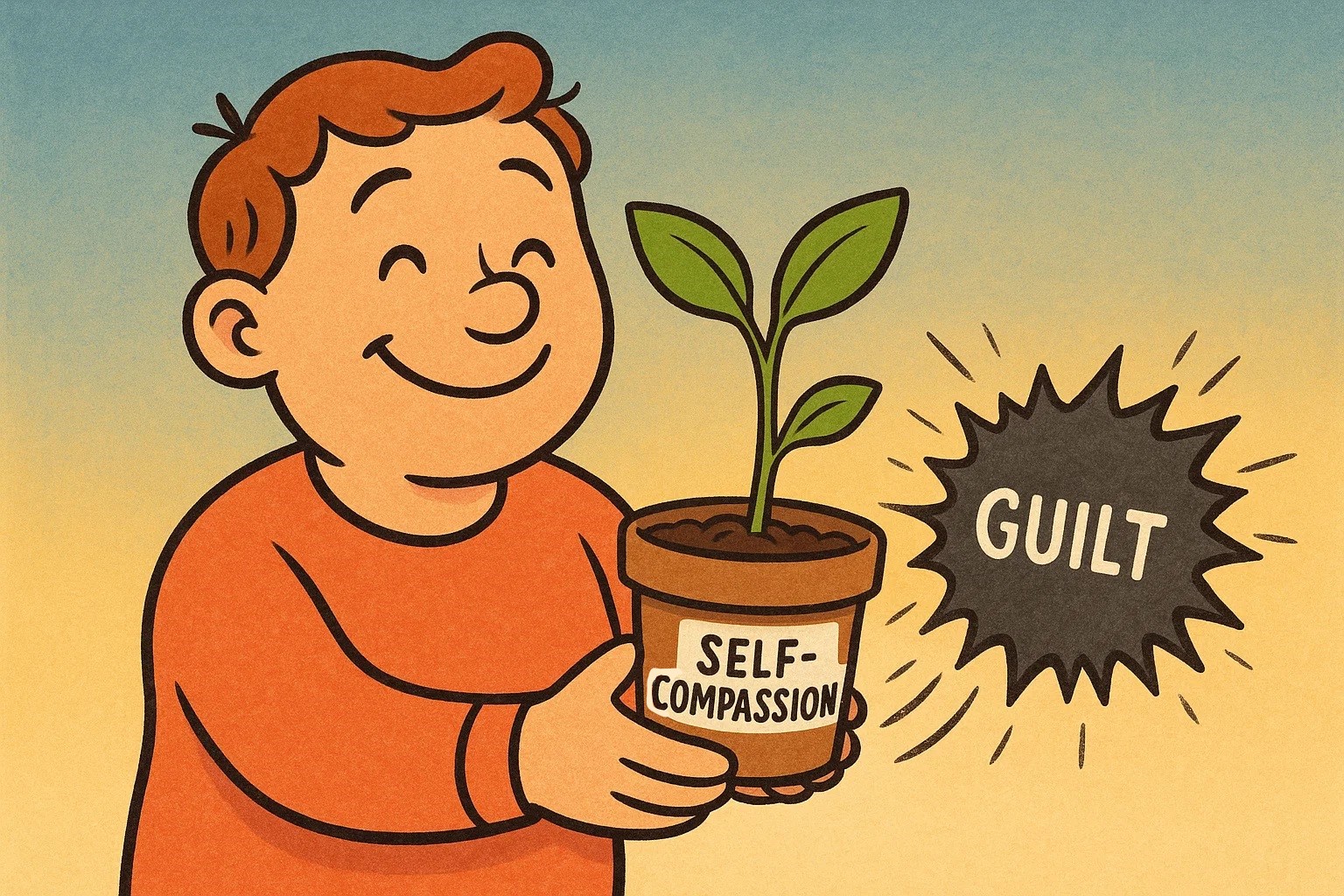
Addressing parental guilt requires intentional strategies and often involves challenging long-held beliefs about what constitutes “good” parenting.
Practicing Self-Compassion and Forgiveness
The Self-Compassion Practice: When guilt arises, ask yourself:
- “What would I tell a friend experiencing this situation?”
- “Is this guilt helping me be a better parent?”
- “What can I learn from this experience?”
Reframe guilt as information rather than punishment. Instead of “I’m a terrible parent for losing my temper,” try “I’m human, and this shows me I need better stress management tools.”
Forgiveness Exercises:
- Write yourself a letter of forgiveness for specific guilt triggers
- Practice daily self-compassion phrases
- Acknowledge mistakes without character assassination
- Focus on repair rather than self-punishment
Identifying Guilt Triggers
Understanding your specific guilt patterns enables more targeted interventions:
Guilt Journaling: Track guilt episodes for one week, noting:
- Specific situations that trigger guilt
- Underlying beliefs or expectations
- Physical sensations associated with guilt
- Outcomes when you act from guilt versus intention
Common Trigger Categories:
- Work-related absences or distractions
- Discipline and boundary-setting moments
- Comparison to other families
- Children’s disappointment or tears
- Personal time and self-care activities
Seeking Professional Help
Professional support can provide valuable perspective and tools:
When to Consider Therapy:
- Guilt significantly impacts daily functioning
- Family relationships suffer due to guilt-driven behaviors
- Physical symptoms accompany emotional guilt
- Previous attempts at change feel unsuccessful
Types of Helpful Therapy:
- Cognitive Behavioral Therapy (CBT) for thought pattern changes
- Acceptance and Commitment Therapy (ACT) for value-based living
- Family therapy for systemic guilt issues
- Parent coaching for specific skill development
Communication and Support
Building supportive relationships reduces isolation and provides perspective:
Partner Communication: Share guilt experiences with co-parents to develop consistent approaches and mutual support.
Parent Support Groups: Research from Family Practice publication shows that parents often benefit from connecting with others facing similar challenges. Single parents particularly benefit from community connections.
Honest Conversations with Children: Age-appropriate discussions about mistakes and learning can model healthy emotional processing.
Focusing on the Present
Mindfulness practices help interrupt guilt cycles and promote intentional parenting:
Present-Moment Awareness: When guilt about past decisions arises, gently redirect attention to current opportunities for connection and growth.
Intention-Based Decision Making: Before major parenting decisions, clarify your values and intentions rather than acting from guilt avoidance.
Gratitude Practices: Regular appreciation for positive parenting moments balances the guilt narrative with recognition of your efforts and successes.


